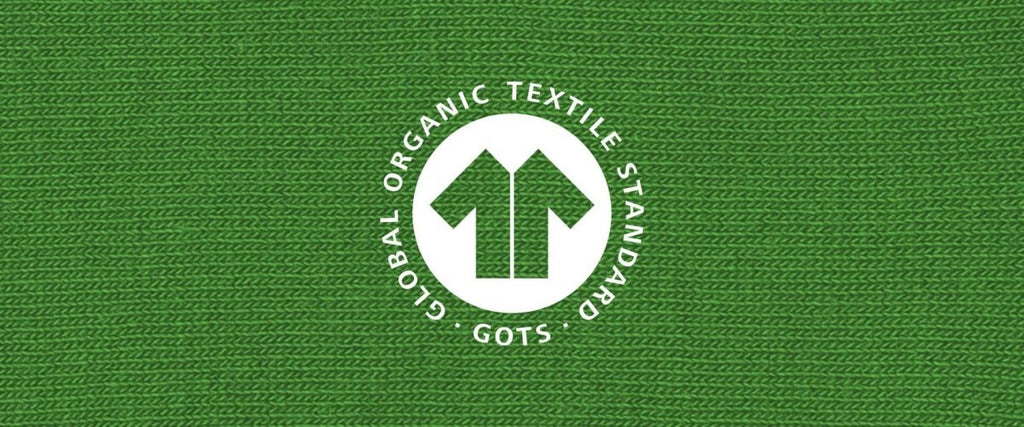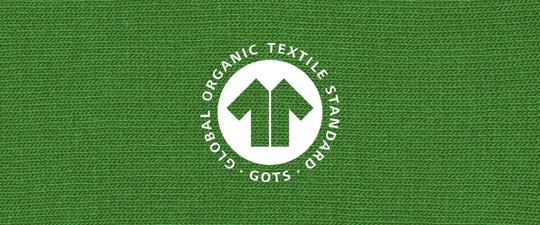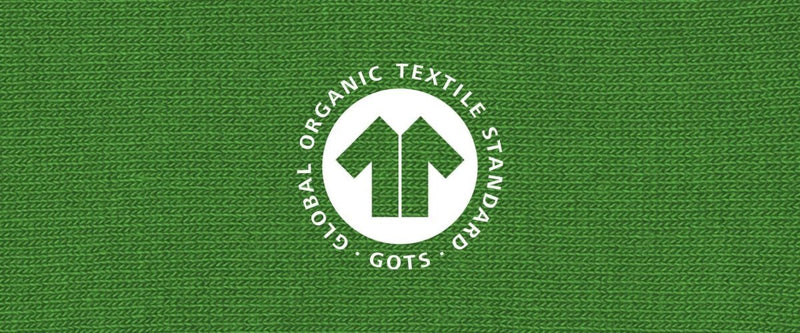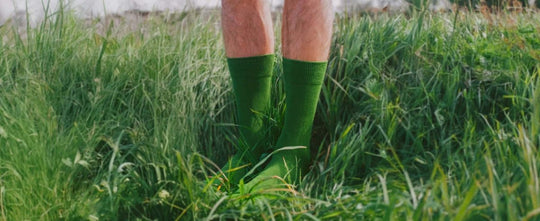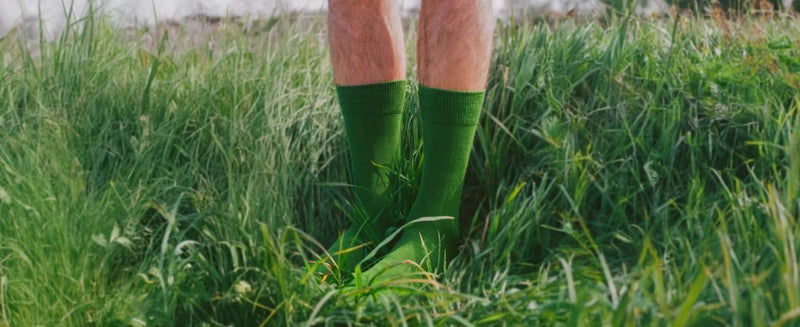The Global Organic Textile Standard (GOTS for short) is one of the best-known ecological product standards for the sustainable processing of clothing and textiles made from organic fibers. As an independent, valid seal, the standard offers good orientation for the purchase of sustainable products.
The certification includes strict criteria along the entire value chain. This holistic approach offers a transparent basis for socially acceptable and ecologically sensible textile production and distribution.
Here you can find our GOTS-certified socks
Content

GOTS criteria at a glance
organic fibers
- The basis of every Global Organix Textile Standard is a high proportion of natural, organic fibers such as organic cotton or organic wool.
Ecological and social criteria
- Ecological criteria in production, processing and sale: strict chemical management, waste water
- Social criteria: Living wages, health and safety protection at work, social security, employment contracts
All processing stages
- The Global Organic Textile Standard follows a holistic concept. This means that strict guidelines apply along the entire value chain. From the cultivation of the cotton, the processing of the fibers, the dyeing of the fabrics, through the production of the products to the sale of the products, there are ecological and social criteria that must be observed.
Independent certification
- The standard's control system is based on independent certifications accredited by the standard. These inspection bodies are responsible for inspecting and certifying the manufacturing companies and distributors. An annual audit ensures that all criteria are met in every production and sales process.

GOTS - products made from natural fibers
Natural fibers are textiles that are obtained from controlled ecological cultivation, such as organic cotton, or controlled ecological animal husbandry, such as organic wool. The most commonly used basis for GOTS-certified products is ecologically grown organic cotton. This is also often marked with cotton (kbA) (= controlled organic cultivation).
Products must contain at least 70% fibers of natural and organic origin in order to receive the Global Organic Textile Standard certification. A natural fiber content of over 95% is required for the GOTS organic label. With a share of natural fibers from 70%, the certificate GOTS Made with organic can be issued. If products contain less than 70% natural fibers, certification is not possible.
Ecological criteria
An important part of the guidelines is that Global Organic Textile Standard-certified goods are produced, transported and stored separately along the entire value chain. In addition to the clear separation from conventional goods and the prevention of any contamination, chemicals management is also a main component of the certification. The standard also ensures that processing does not contaminate waste water streams or expose workers to harmful chemicals. You can find a detailed list of all environmental criteria here .
Social criteria
The standard includes strict social standards along the production chain. These are based on the standards of the International Labor Organization (ILO). The aim is to pay living wages and ensure health and safety protection in the workplace. Social security and employment contracts are a must, child labor is prohibited. Discrimination in the workplace is also prohibited. The certificate offers a detailed online insight into all guidelines and key figures. You can find more information about social criteria here .

FAQs on GOTS
The GOTS seal stands for the Global Organic Textile Standard and is a certification that guarantees the sustainability and environmental friendliness of textile products. When a product bears the GOTS seal, it means it meets the strict guidelines of the standard. It guarantees that the materials used are organic and contain no harmful chemicals. In addition, social criteria are also taken into account, such as fair working conditions and fair wages along the entire supply chain. The GOTS seal gives consumers the security that they are buying a product that has been manufactured in an environmentally and socially responsible manner.
The abbreviation GOTS stands for "Global Organic Textile Standard". GOTS is a globally recognized standard that ensures that organic and natural textiles comply with social and ecological criteria.
When a product bears the GOTS seal, it means it meets the strict guidelines of the standard. It guarantees that the materials used are organic and contain no harmful chemicals. In addition, social criteria are taken into account along the entire supply chain, such as fair working conditions and fair wages.
Only products that consist of at least 70% ecological natural fibers are eligible for the GOTS certificate. Means: GOTS ensures that the materials used were produced organically, without the use of pesticides or genetically modified organisms.
The Global Organic Textile Standard (GOTS) sets strict requirements for the use of harmful chemicals in textile products. The certification excludes certain harmful substances. It guarantees that GOTS certified products are considered safe for human use.
Both the Global Organic Textile Standard (GOTS) and the Oeko-Tex Standard 100 are important certifications in the textile sector and each have their own focus.
GOTS focuses on the ecological and social sustainability of textiles. GOTS ensures that the materials used are organic, that the use of harmful chemicals is limited and that strict social criteria are met. GOTS covers the entire production process and has a comprehensive, holistic approach.
The Oeko-Tex Standard 100 mainly focuses on the safety of textile products in relation to harmful substances. He checks whether the products comply with the specified limit values for certain chemical substances. Oeko-Tex 100 refers to both legally regulated substances and potentially harmful substances.
Both standards have their own advantages and play an important role in promoting sustainability and safety in the textile industry. While GOTS follows a broader, holistic approach with ecological and social guidelines, the Oeko-Tex Standard 100 is reduced to the fact that organic textiles are free of harmful substances. It can be useful to consider the priorities and values that are personally important to you in making a decision about which standard best suits individual needs.
The Global Organic Textile Standard (GOTS) seal is awarded by independent certification bodies that are accredited by GOTS. These certification bodies are specialized organizations that carry out the certification process and verify compliance with the GOTS guidelines. They inspect and certify the processing, manufacturing and trading companies along the entire supply chain to ensure they meet GOTS standards.


GOTS & Dilly Socks
DillySocks has been GOTS certified since 2020. In our latest collection, around 50% of our products carry the label. Unfortunately, we are currently unable to certify all of our socks to the standard, as designs that are particularly difficult to create require a higher percentage of (recycled) polyester. We are constantly working on increasing the proportion of Global Organic Textile Standard-certified products step by step in close cooperation with our producers.
By the way: In our shop, you can use our filter function to see which of our products meet the Global Organic Textile Standard.
Discover our GOTS certified products
Oekotex Standard 100 & Dilly Socks
While not all of our products are yet compliant with the Global Organic Textile Standard, we ensure that all of our socks are made from organic cotton and manufactured in a facility that meets the requirements of the Global Organic Textile Standard.
In addition, all our products comply with the Oeko-Tex Standard 100 . This certification ensures that all fibers used have been successfully tested for harmful substances and are considered safe for human use. You can find out more about the safety of our products in terms of freedom from harmful substances here .
Would you like to find out more information about our sustainable approach in addition to our certifications? No problem, look here !
